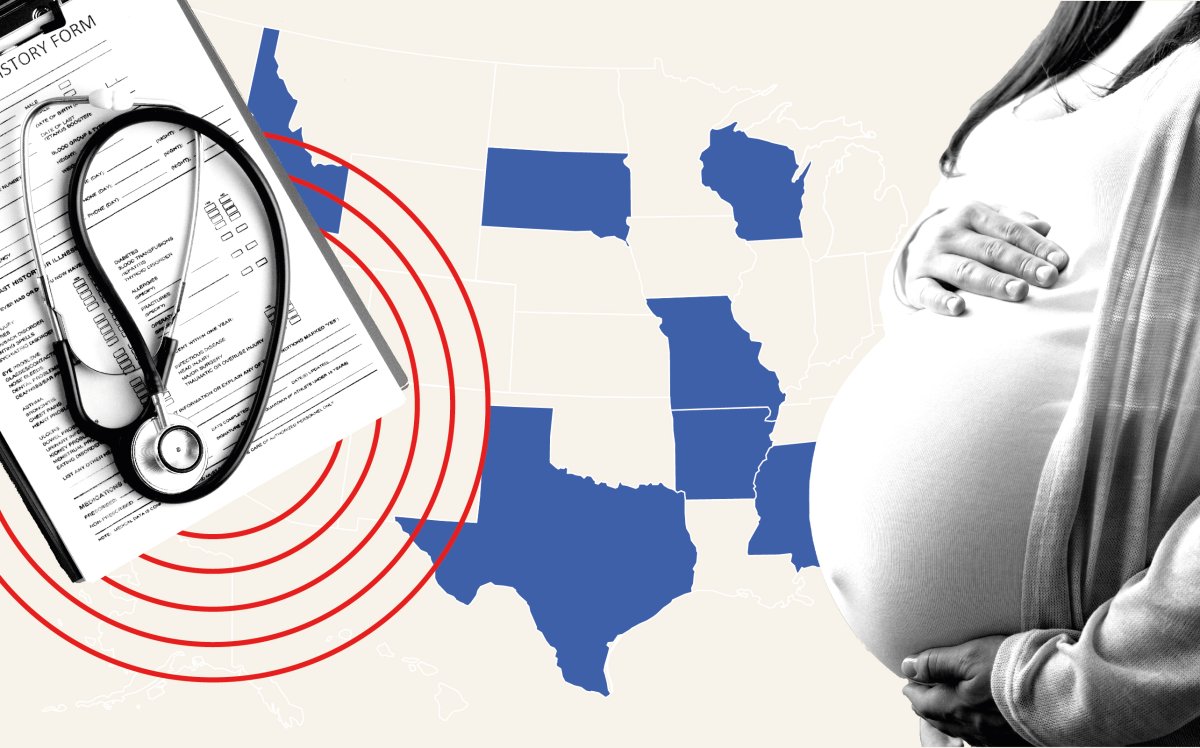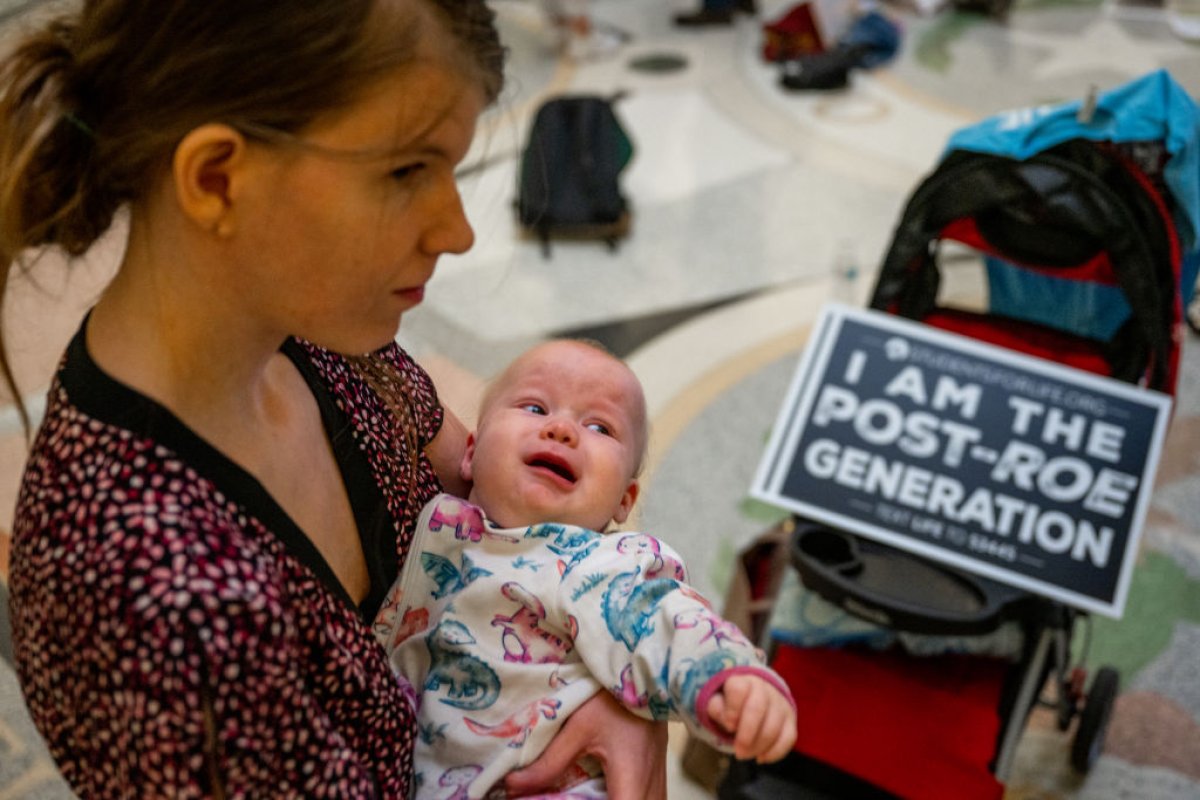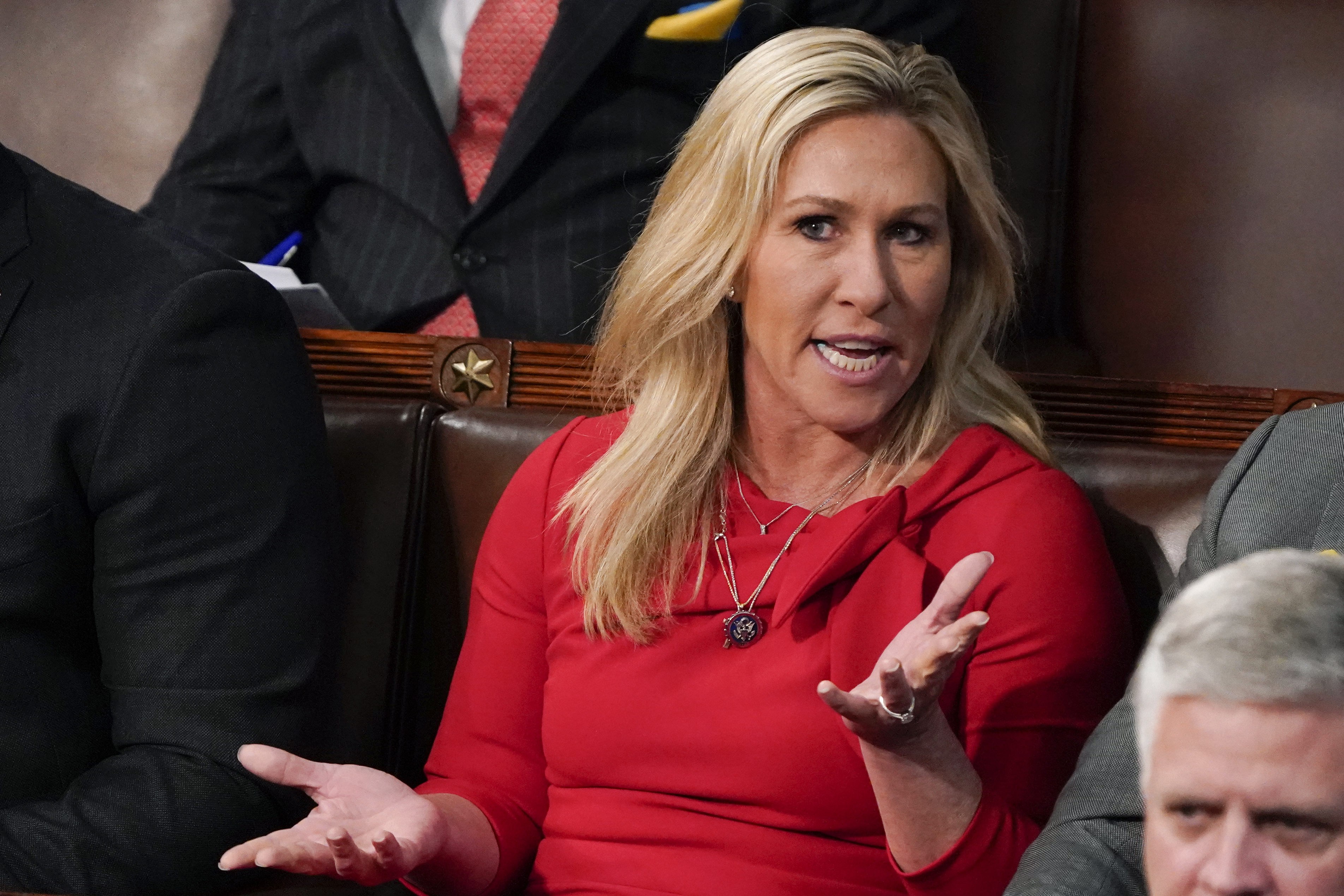- The U.S. has the highest maternal mortality rate among developed countries, and seven states have instituted abortion bans while keeping postpartum Medicaid coverage limited to 60 days.
- These states are Arkansas, Idaho, Mississippi, Missouri, South Dakota, Texas and Wisconsin.
- Such a combination could have a devastating effect on maternal mortality rates, experts have told Newsweek.
- States with restrictive abortion bans and laws generally have poorer health outcomes and weaker social safety net programs.
- Studies suggest that 52 percent of pregnancy-related deaths can occur up to a year after birth.
Many U.S. states have for the past year been seeking to extend the healthcare coverage new mothers receive under Medicaid to 12 months after the birth of their child, to protect them during a difficult and vulnerable period.
Some of those states, such as Florida and Georgia, have also legislated to limit or ban abortions following the overturning of Roe v. Wade by the Supreme Court last summer—which experts who spoke to Newsweek have linked to expanding postpartum Medicaid coverage—and many have increased postpartum Medicaid without new limits on abortion being imposed.
However, there are seven states—Arkansas, Idaho, Mississippi, Missouri, South Dakota, Texas and Wisconsin—that have instituted abortion bans while keeping postpartum Medicaid coverage limited to 60 days.
This combination, experts and campaigners believe, will have a devastating effect on maternal mortality rates, and could come to demonstrate why other states have already moved to increase their coverage.
"There is strong evidence that states with restrictive abortion bans and laws have higher maternal mortality rates," Cat Duffy, a policy analyst at the National Health Law Program (NHLP), told Newsweek.
A 2022 study by the University of Colorado, Boulder, found that a year after a total abortion ban is implemented, the maternal mortality rate is estimated to rise by 24 percent. A similar study by Tulane University in 2021 suggested a 7 percent increase in areas with greater restrictions on abortion access.

As a result of the ban, there would be a greater number of women carrying babies to term, with the risks that go with pregnancy and childbirth—and limited healthcare provision in the months after a child is born makes the period even more dangerous.
"We know that carrying a pregnancy to term has more risks than abortion care," said Dr. Smita Carroll, an OBGYN in New Mexico and a Physicians for Reproductive Health fellow.
Without extended Medicaid coverage, particularly those from poorer backgrounds, who might struggle to afford medical bills, are less likely to seek care, and health conditions can go untreated.
"The truth of it is, is that when people don't have access to affordable healthcare, they aren't seeing doctors—which means they aren't getting the care that they need, whether it be preventative or not," said Blair Wallace, a policy and advocacy strategist at the American Civil Liberties Union in Texas.
Why 60 Days of Medicaid Isn't Always Enough
Even at the most restrictive end of Medicaid coverage, new mothers still have at least 60 days from the birth of their child to seek medical help. However, this is arguably not long enough: a 2020 report by the Commonwealth Fund found 52 percent of pregnancy-related deaths can occur up to a year after birth.
"This potential loss of coverage is important because continuity of health care coverage is critical to catching and treating the health conditions and emergencies that are in part to blame for the United States' high maternal mortality and morbidity rates," said Amy Chen, a senior attorney at NHLP.
Carroll said that maternal mortality "is largely preventable," and maintaining Medicaid coverage for a year allows doctors such as herself to reduce the chance of pregnancy-related deaths, but also treat other medical conditions, such as postpartum depression, diabetes and heart conditions, that can crop up during and after pregnancy.
"Having any barrier to coverage in the postpartum setting is a direct barrier for accessing necessary care," Carroll told Newsweek.
To compound the issue, "generally it is true that states with the most restrictive abortion laws also tend to have the weakest social safety net programs and poorer health outcomes," Duffy said, citing a 2022 report by the Center for American Progress, which notes: "States hostile to abortion also have some of the highest rates of uninsured and comprise the majority of those still refusing to expand Medicaid."
'In Texas, I Barely Have Reproductive Rights'
For instance, Texas already ranks eighth worst for maternal mortality rates in the U.S., according to the latest figures from World Population Review. Kaiser Family Foundation analysis of federal data shows that half of all births in the state are covered by Medicaid.
"Currently, in Texas, I barely have reproductive rights," Wallace said. "We are certainly facing a maternal mortality and generally a pregnancy care crisis."
Wallace said that when she had a child herself, she had to hand over thousands of dollars to get into the hospital to deliver, despite having pregnancy insurance. Without Medicaid supplementing this, she says she would not have been able to afford that care.
"In Texas, there is a long history of the state not putting the money where they say their values are," she argues. "They say that they value mothers and children, and yet our maternal mortality data does not reflect that."
A Texas Health and Human Services Commission spokesperson noted that "lawmakers have submitted bills this legislative session to extend postpartum Medicaid coverage to a full year." As of March 16, it had been left pending in committee. Newsweek reached out to the governor's office via email for comment on Friday.

Texas proposed extending postpartum Medicaid coverage to just six months in 2021, but was denied approval by the federal government in 2022. While the state government said this would still have had "long-term benefits of improving continuity of care," the Texas Tribune reported that it had been rejected as the language of the bill appeared to tacitly exclude women who had abortions.
Responding to the proposal in 2022, Jamila Taylor, then-director of health care reform at The Century Foundation think-tank, wrote that while an extension was a good thing, 12-month postpartum coverage was "the ideal and the most evidence-based approach" to avoiding negative health outcomes.
State legislation was introduced to extend postpartum coverage to 12 months in Idaho in February, and South Dakota in March, while Mississippi's GOP governor Tate Reeves signed a bill on March 16 to extend postpartum Medicaid from July 1 to build "a culture of life throughout our state."
Wisconsin's health department proposed a 30-day extension in 2022, federal approval of which remains pending. A spokesperson for the state's Democrat governor, Tony Evers, said he had advocated for a 12-month extension since taking office, but noted "Republicans in the Wisconsin State Legislature have rejected this proposal in the last two budgets."
A spokesperson for the Arkansas Division of Medical Services said that during the public health emergency of the coronavirus pandemic, "we have continued coverage beyond the postpartum period even if the beneficiary is no longer eligible." A bill to extend Medicaid to a year passed the Missouri senate on March 3, but faces similar issues with wording as Texas' bill.
However, with abortion bans already in place, the delay in implementing Medicaid extensions poses an immediate problem for pregnant women in the states.
Newsweek also reached out to the governor's office and relevant authorities of Idaho, Missouri and South Dakota for comment via email on Saturday.
Similarly, there are other states, such as Utah and Arizona, that have implemented limits on abortion without yet increasing postpartum Medicaid. Arizona submitted an initial application to extend in 2022, while a 2023 legislative effort in Utah was struck down.
Both Chen and Wallace note that maternal mortality rates are disproportionately higher among black and indigenous women. Wallace said: "Black women are two times more likely to die during childbirth than me, as a white woman—that is despicable; there is just no reason for that." In fact, the Commonwealth Fund found that the rate among black women was 2.5 times higher than white women, and more than double for indigenous women.
According to Chen, there is even disparity in the coverage individual mothers may receive in states with 60-day postpartum Medicaid.
"The technical coverage time is the end of the month in which the 60th day following the end of the pregnancy falls," she said. "So if your pregnancy ends early in the month it can be closer to 3 months, but if your pregnancy ends later in the month it's closer to 2 months."
A Dangerous Time
For states that have instituted anti-abortion laws, to avoid their maternal mortality rates worsening, extending Medicaid coverage provides healthcare workers with a better shot of identifying and treating conditions new mothers may have.
"Having a child is an incredibly transformative period of time," Carroll said, adding that extended Medicaid "really does help in terms of providing vital care at a really important time of their life."
Since 2022, Kentucky, Louisiana and Oklahoma have increased postpartum Medicaid coverage to 12 months while instituting full abortion bans. Louisiana has the worst maternal mortality rate of all U.S. states, according to the 2023 figures.
It is as-yet unclear what effect these two interventions will have on maternal mortality rates; due to the coronavirus pandemic, official statistics for 2021 were only released on Thursday.
The Political Dimension
While these states may be viewed as looking to prevent unnecessary deaths as they uphold their anti-abortion stance, Wallace believes it to be cynical.
"Polling goes hand-in-hand with policy, and I think that a lot of these states are realizing that some of the laws they put into effect are wildly unpopular," she told Newsweek. According to a February Gallup poll, the proportion of Americans dissatisfied with abortion laws has risen significantly, to 46 percent, since 2021.
"In some regards, Republicans are saying, 'well gosh, what can we do to make us look better in this light?'" Wallace added.
As of February, 47 percent of Texans believe abortion laws should be less strict, according to figures by the University of Texas. In neighboring New Mexico—which has no limits on abortion and 12-month postpartum coverage—since the overturning of Roe v. Wade, Carroll says there has been a "large increase" in the number of patients coming to the state from elsewhere, including Texas, seeking abortions.
There are a raft of other states—such as Virginia, California and Hawaii, to name just a few—which have made similar increases in coverage in the past year without changing their abortion laws.
While these changes may not be explicitly linked to the Supreme Court's ruling on abortion, the U.S. has the highest maternal mortality rate among developed countries, of 21 deaths per 100,000 people, according to UNICEF data, making the issue pressing for all states. As studies show, abortion laws are likely to push the nationwide rate higher.
"I would like to think that it's people just seizing on an opportunity, but also: it's time," Wallace said. "There's just no good reason that our country should have people in these terrible situations where they're able to go bankrupt... for giving birth."
Update 03/21/23, 4:37 a.m. ET: This article has been updated to include comment from the Arkansas Division of Medical Services and spokespeople for the governors of Wisconsin and Mississippi.
Uncommon Knowledge
Newsweek is committed to challenging conventional wisdom and finding connections in the search for common ground.
Newsweek is committed to challenging conventional wisdom and finding connections in the search for common ground.
About the writer
Aleks Phillips is a Newsweek U.S. News Reporter based in London. His focus is on U.S. politics and the environment. ... Read more
To read how Newsweek uses AI as a newsroom tool, Click here.








